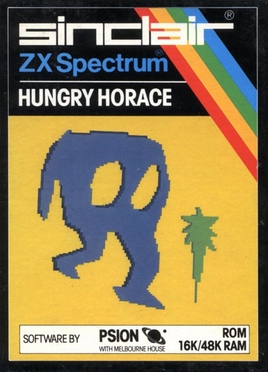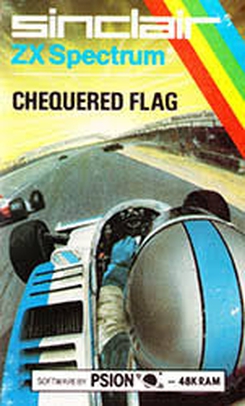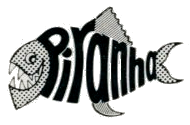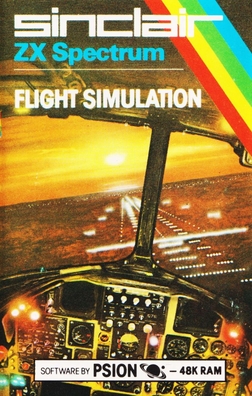
The ZX Spectrum is an 8-bit home computer developed and marketed by Sinclair Research. Considered one of the most influential computers ever made, it is also one of the best-selling computers ever, with over five million units sold. It was released in the United Kingdom on 23 April 1982, and around the world in the following years, most notably in Europe, the United States, and Eastern Bloc countries.

Tranz Am is an action video game developed and published by Ultimate Play the Game that was released for the ZX Spectrum in July 1983. The game is set in a post-apocalyptic version of the United States and centres around a racing car driver on his quest to obtain the Eight Great Cups of Ultimate, which are scattered throughout the country.

Barbarian: The Ultimate Warrior is a 1987 video game developed and published by Palace Software for the Amstrad CPC, Commodore 64, and ZX Spectrum. The game was ported to many other systems and was licensed to Epyx who published it as Death Sword in the United States.

Thrust is a 1986 video game programmed by Jeremy C. Smith for the BBC Micro and published by Superior Software. The player's aim is to manoeuvre a spaceship by rotating and thrusting, as it flies over a two-dimensional landscape and through caverns. The gameplay of Thrust was heavily inspired by Atari's Gravitar.

Superior Software Ltd is a video game publisher. It was one of the main publishers for the BBC Micro and Acorn Electron computers in the 1980s and early 1990s, and occasionally published software to the Commodore 64, Amiga, ZX Spectrum and Amstrad CPC. It currently releases games for Microsoft Windows, iOS and Android, mostly updates of its original games.

Chuckie Egg is a platform game released by A&F Software in 1983 initially for the ZX Spectrum, BBC Micro, and Dragon 32/64. It was ported to the Commodore 64, Acorn Electron, MSX, Tatung Einstein, Amstrad CPC, and Atari 8-bit computers. It was later updated for the Amiga, Atari ST, and IBM PC compatibles.

Hungry Horace is a video game developed by Psion Software Ltd. and published by Sinclair Research in 1982 for Commodore 64, Dragon 32/64, Timex Sinclair 2068, ZX Spectrum, and later for Microsoft Windows and Android. It is the first game in the Horace series. The gameplay is noted to be very similar to Pac-Man, involving the collection of food pellets in a maze while avoiding enemies. Despite this, critical reception of the game was generally positive upon release.

Psygnosis Limited was a British video game developer and publisher headquartered at Wavertree Technology Park in Liverpool. Founded in 1984 by Ian Hetherington, Jonathan Ellis, and David Lawson, the company initially became known for well-received games on the Atari ST and Amiga. In 1993, it became a wholly owned subsidiary of Sony Computer Entertainment (SCE) and began developing games for the original PlayStation. It later became a part of SCE Worldwide Studios. The company was the oldest and second largest development house within SCE's European stable of developers, and became best known for franchises such as Lemmings, Wipeout, Formula One, and Colony Wars.

Bug-Byte Software Ltd. was a video game company founded in 1980 in Liverpool, initially producing software for the Acorn Atom and ZX80. Bug-Byte's first hit was Don Priestley's Mazogs which was one of the most successful titles for the ZX81. In 1983, it published Manic Miner, considered to be one of the most influential platform games of all time. The company went into liquidation in 1985 but their name and logo were purchased by Argus Press PLC for use as a budget software label.

Brataccas is a science fiction action-adventure game released in 1985 for the Amiga, Atari ST, and Macintosh. It was the first game published by Psygnosis. Brataccas is built on the remains of the much-hyped vaporware project Bandersnatch, which was partially developed by Imagine Software. The storied tale of the game's development led to close press attention in the UK computer market. When Brataccas finally shipped, this attention resulted in considerable coverage in the computer press. It was generally reviewed poorly due to significant control problems, although the graphics were widely praised.
Quicksilva was a British games software publisher active during the early 1980s.

Hunchback is a video game developed by Century Electronics and published in arcades in 1983. The game is loosely based on the 1831 Victor Hugo novel The Hunchback of Notre-Dame and the player controls Quasimodo. Set on top of a castle wall, the player must guide the Hunchback from left to right while avoiding obstacles on a series of non-scrolling screens. The goal of each screen is to ring the church bell at the far right.

Chequered Flag is a racing video game developed by Psion Software and published by Sinclair Research in 1983. It was the first driving game published for the ZX Spectrum and one of the first computer car simulators.

Bugaboo (The Flea), later published in Spain as La Pulga, is a video game written by the Spanish programming duo Paco Portalo and Paco Suarez for the ZX Spectrum and published by Quicksilva in 1983. It was later released for the Commodore 64 and MSX were produced. The Amstrad CPC port was published under the name Roland in the Caves using the Roland character.
Edge Games, Inc. is an American video game developer and publisher headquartered in Pasadena, California, best known for the practices of its founder and chief executive officer, Tim Langdell, in enforcing trademarks relating to the word "edge", which sources have described as "litigious".

Piranha Software was a short-lived video game publishing label created by Macmillan Publishers in 1986 and closed eighteen months later. In that time it gained a reputation for its unusual output from well known developers such as Don Priestley, Design Design and Delta 4. The majority of their games featured licensed properties including the first video game based on the Discworld novels and two games based on the animated television series The Trap Door.

The Computer Edition of Scrabble, also known as Computer Scrabble is a computer version of the board game Scrabble, licensed from J. W. Spear & Sons and released by Little Genius for the Apple II in 1982. It was subsequently released for most home computers of the time.

Flight Simulation is a flight simulation program written by Psion and marketed by Sinclair Research for the ZX Spectrum and ZX81 home computers.

Mined-Out is a maze video game created by Ian Andrew originally for the ZX Spectrum home computer in 1983. The objective is to carefully navigate a series of grid-shaped minefields by moving from the bottom to the top of the screen. The number of invisible mines in spaces adjacent to the player's current position is shown but not their precise location, requiring deduction to advance past them and avoid getting blown up. Additional challenges are introduced in later stages.

Automonopoli, also known as Go to Jail, is an unauthorised computer version of the boardgame Monopoly, released in June 1983 by Automata UK for the ZX Spectrum. Although other two-player Monopoly computer programs already existed, the developer advertised that their Automonopoli was the first with an artificial intelligence strong enough to compete against and defeat human players.



















